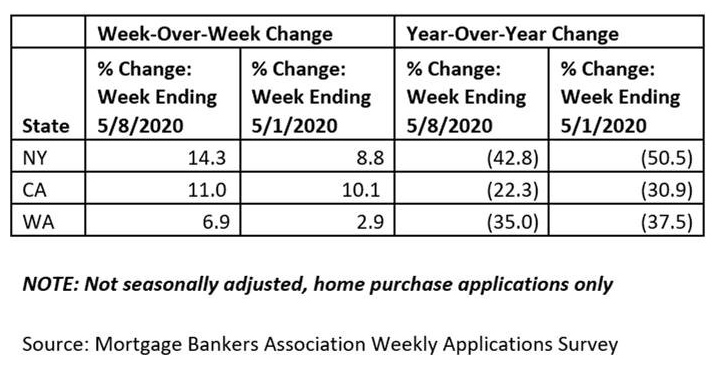
Purchase Applications Drive Increase in MBA Weekly Survey

Mortgage applications edged up for the second straight week, driven by strong purchase application activity, the Mortgage Bankers Association reported in its Weekly Mortgage Applications Survey for the week ending May 8.
The Market Composite Index increased by 0.3 percent on a seasonally adjusted basis from one week earlier. On an unadjusted basis, the Index increased by 1 percent compared to the previous week.
The unadjusted Refinance Index decreased by 3 percent from the previous week and was 201 percent higher than the same week one year ago. The refinance share of mortgage activity decreased to 67.0 percent of total applications from 70.0 percent the previous week.
The seasonally adjusted Purchase Index increased by 11 percent from one week earlier. The unadjusted Purchase Index increased by 11 percent compared to the previous week and was 10 percent lower than the same week one year ago.
“There continues to be a stark recovery in purchase applications, as most large states saw increases in activity last week,” said Joel Kan, MBA Associate Vice President of Economic and Industry Forecasting. “In the 10 largest states in MBA’s survey, New York – after a 9 percent gain two weeks ago – led the increases with a 14 percent jump. Illinois, Florida, Georgia, California and North Carolina also had double-digit increases last week. We expect this positive purchase trend to continue – at varying rates across the country – as states gradually loosen social distancing measures, and some of the pent-up demand for housing returns in what is typically the final weeks of the spring home buying season.”
Kan noted mortgage rates stayed close to record-lows, but refinance applications decreased for the fourth consecutive week, driven by a 5 percent drop in conventional refinances. “Despite the downward trend over the last month, mortgage lenders remain busy,” he said. “Refinance activity was up 200 percent from a year ago.”
Looking at the impact at the state level, MBA provided results showing the non-seasonally adjusted, week over week percent change in the number of purchase applications from Washington, California and New York:

The FHA share of total applications increased to 11.5 percent from 11.1 percent the week prior. The VA share of total applications increased to 13.7 percent from 13.3 percent the week prior. The USDA share of total applications increased to 0.6 percent from 0.5 percent the week prior.
MBA reported the average contract interest rate for 30-year fixed-rate mortgages with conforming loan balances ($510,400 or less) increased to 3.43 percent from 3.40 percent, with points decreasing to 0.29 from 0.30 (including origination fee) for 80 percent loan-to-value ratio loans. The effective rate increased from last week.
The average contract interest rate for 30-year fixed-rate mortgages with jumbo loan balances (greater than $510,400) remained unchanged at 3.69 percent, with points decreasing to 0.33 from 0.34 (including origination fee) for 80 percent LTV loans. The effective rate decreased from last week.
The average contract interest rate for 30-year fixed-rate mortgages backed by FHA remained unchanged at 3.37 percent, with points increasing to 0.21 from 0.20 (including origination fee) for 80 percent LTV loans. The effective rate remained unchanged from last week.
The average contract interest rate for 15-year fixed-rate mortgages decreased to 2.92 percent from 2.93 percent, with points decreasing to 0.28 from 0.29 (including origination fee) for 80 percent LTV loans. The effective rate decreased from last week.
The average contract interest rate for 5/1 adjustable-rate mortgages increased to 3.26 percent from 3.20 percent, with points decreasing to 0.04 from 0.36 (including origination fee) for 80 percent LTV loans. The effective rate decreased from last week.
The ARM share of activity decreased to 2.9 percent of total applications.
The survey covers more than 75 percent of all U.S. retail and consumer direct residential mortgage applications and has been conducted weekly since 1990. Respondents include mortgage bankers, commercial banks and thrifts.
